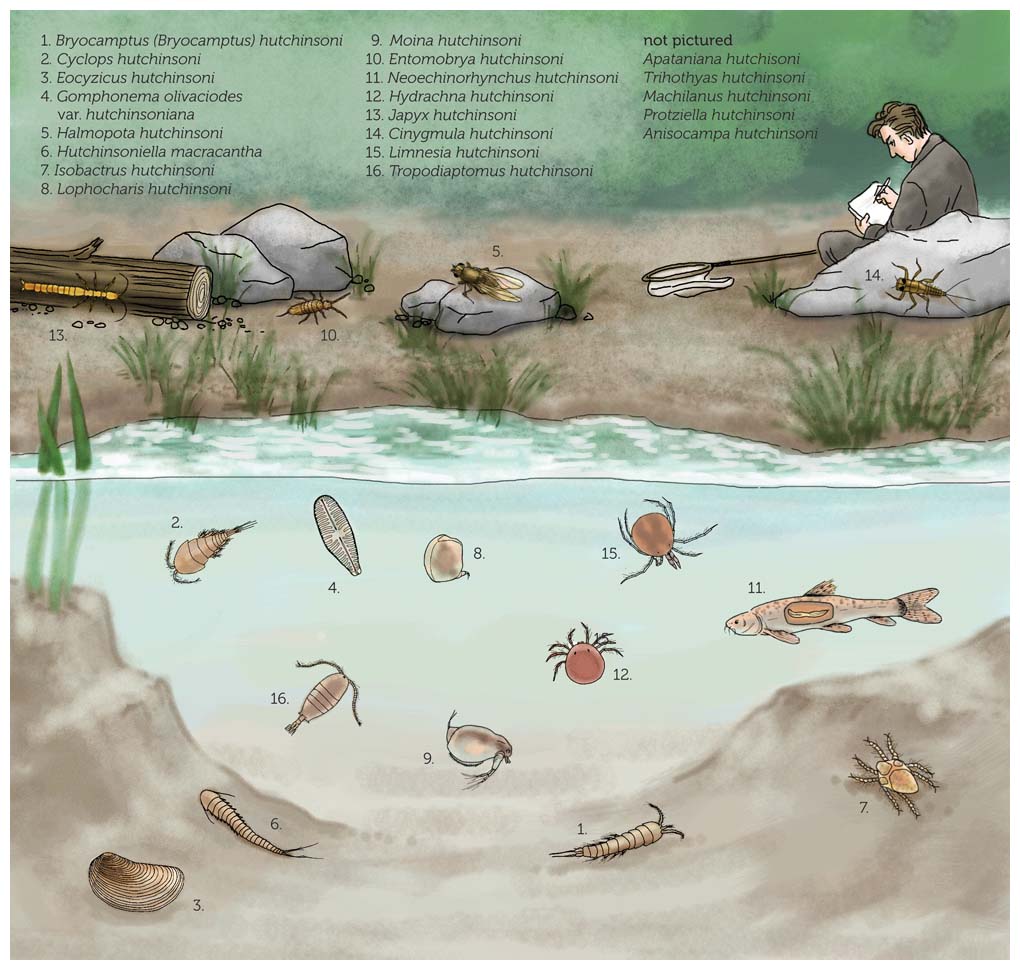G. Evelyn Hutchinson’s Exultation in Natural History
By Laura J. Martin
The ecologist most remembered for bringing experimental work to a largely observational field nevertheless loved and promoted organismal description.
The ecologist most remembered for bringing experimental work to a largely observational field nevertheless loved and promoted organismal description.

DOI: 10.1511/2016.121.242
Natural history, the close observation of organisms in their environments, was once the central component of biological education. Natural historians went into the field to study organisms’ distributions, behaviors, interactions, and life histories. But today it is easy to earn a degree in biology without setting foot outside.
Few universities offer courses on species identification, and biological research collections are struggling to maintain funding. Even in ecology, a subdiscipline of biology that emerged from natural history studies, researchers are more likely to specialize in an empirical method or theoretical question than in what lives around us. As a result, most people—even trained ecologists—can distinguish between the logos of Honda and Hyundai more readily than they can the leaves of red and silver maples. Meanwhile, species continue to disappear from the Earth in what some contend is the planet’s sixth major extinction event.
For some ecologists, their discipline’s turn away from natural history is troubling, and they have begun to defend descriptive, observational, and organism-based studies. Joshua Tewksbury, for example, an ecologist at the University of Washington, has written about the ways in which knowledge of natural history informs medicine, food security, biodiversity conservation, and ecological forecasting. Others have developed digital tools, including field guide apps and data repositories, that aim to make natural history accessible to the public and to increase access to data gathered by the public. For example, through eBird (a real-time online checklist program), the Cornell Lab of Ornithology and the National Audubon Society have made it possible for tens of thousands of bird watchers to collect and store their observations in a unified database. Another initiative, the National Science Foundation’s Collections in Support of Biological Research Program, aims to make natural history more appealing to students and funding agencies.
Most people—even trained ecologists—can distinguish the logos of Honda and Hyundai more readily than they can the leaves of red and silver maples.
As we reimagine natural history’s relationship to ecology, it’s worth revisiting the work of one of the most influential ecologists in the field’s history, G. Evelyn Hutchinson (1903–1991), who is credited with shifting ecology’s focus from the individual organism to the abstracted ecosystem. Hutchinson is renowned in scientific circles for establishing the sciences of limnology (the study of inland waters), population biology, and ecosystem ecology, but at heart he was motivated more by the beauty of other species than by disciplinary boundaries.
American Scientist has a special relationship with Hutchinson and his passions. He explored his love of natural beauty in Marginalia, a column he wrote regularly for this magazine from 1943 to 1955. After World War II, researchers in the United States, including Hutchinson, questioned the role of science in society, and specifically whether scientists were responsible for the wartime applications of their research. Many concluded that science and politics were separate spheres, and that scientists should remain detached from their objects of study. Hutchinson took a radically different position, preferring to view science as a mode of illuminating beauty, even as “a technology of love.”

Hutchinson, now celebrated for his work on abstractions such as ecosystems and niches, built his career on deep observation and description of tiny creatures. Hutchinson took to natural history early in life. He was born in Cambridge, England, in 1903 to an academic family. His father, Arthur, was a mineralogist at Cambridge University, and his mother, Evaline, was a suffragist and author of the controversial 1936 book Creative Sex. Growing up, Hutchinson went on frequent fossil-hunting trips with his parents. As a teenager, he spent afternoons in the Cambridge Zoological Museum with his uncle Arthur Shipley, who studied invertebrate morphology, or with friends at the Cambridge Botanical Garden, with whom he collected tadpoles and water beetles. He carried these interests into high school, publishing his first scientific paper at age 15, on a species of swimming grasshopper. By 1922, in his second year at Emmanuel College of Cambridge University, Hutchinson became a fellow of the British Entomological Society.

While at Emmanuel College, Hutchinson discovered the new field of biochemistry through physiologist J. B. S. Haldane, who studied salt metabolism (and who is now known for his mathematical theory of natural selection). After graduating with a bachelor’s degree from the zoology program, Hutchinson pursued his interest in biochemistry at the famous Stazione Zoologica in Naples, Italy. From there he accepted a biology lectureship at the University of Witwatersrand in Johannesburg, South Africa. His partner, Grace Pickford, a fellow zoology student from Cambridge, joined him there. Together, Hutchinson and Pickford collected invertebrates from coastal lakes near Cape Town in order to determine whether there was a relationship between the number of invertebrate species in a lake and its water chemistry. Through this project, Hutchinson first combined his interests in entomology and biochemistry.
From Witwatersrand, Hutchinson applied for a graduate fellowship to work with embryologist Ross Granville Harrison at Yale University. Although the fellowship was spoken for, Harrison offered him an instructor position in the Osborne Zoological Laboratory. Hutchinson quickly accepted. Once in New Haven, he was tasked with teaching freshwater biology. Pickford, meanwhile, worked on her PhD and joined the Bingham Oceanographic Laboratory at Yale in 1931, where she pursued foundational work in comparative endocrinology. The chair of the zoology department selected Hutchinson as lead biologist for the Yale North India Expedition in 1932. Hutchinson’s experience sampling lakes in Goa and Ladakh served as the basis of his first book, The Clear Mirror, published in 1936, laying the groundwork for his later contributions to limnology. This experience also secured him a permanent position at Yale. To the chagrin of some of his colleagues, Hutchinson, who lacked a PhD, was offered a professorship upon his return.

Hutchinson was interested in making broad generalizations about the structure of the natural world, but he was also drawn to classical field observations of organisms in their habitats. At the beginning of his career, the disciplines that came to constitute limnology were taught separately as hydrobiology, physiology, zoology, chemistry, and geology. Hutchinson wanted to bridge these fields to study the adaptations of invertebrates to different chemical conditions in lakes. During the 1930s, Hutchinson and a handful of graduate students began to study biogeochemical cycling, the progression of nutrients through an ecosystem. Up until this point, biologists had studied the circulation of elements such as carbon and nitrogen within individual organisms’ bodies, but not among them.
Work on biogeochemical cycling intersected with America’s wartime efforts in an unpredictable way. In 1939, Yale constructed a cyclotron, a type of particle accelerator that enabled physicists to produce radioactive isotopes and, a few years later at other labs, an atomic bomb. With this new technology at his institution, Hutchinson suggested that radioactive phosphorus and nitrogen could be used to “explore the metabolism of the plankton community.” For years Hutchinson had puzzled over his observation that lakes often experienced several blooms of plankton per summer. It seemed to him that the early blooms should have depleted all of the available phosphorus in the water, making later blooms impossible. In 1941, Hutchinson was able to secure a small amount of radioactive phosphorus-32, which he and his graduate student W. T. Edmondson took out in “a small rowboat with a hand-powered winch” and dumped into Linsley Pond, a kettle pond near campus. This was the first time that scientists intentionally added radioisotopes to the environment. Hutchinson and Edmondson’s initial results were promising: They were able to detect radioactivity in later water samples in a pattern consistent with algae taking up available phosphorus and then falling to bottom of the lake. This session was the beginning of experimental ecosystem ecology, although it would be another three decades before ecosystem became a household term.
At Yale, Hutchinson mentored dozens of students. Many of these individuals went on to be influential in multiple disciplines, including Edward Deevey (1914–1988; paleoecology), Robert MacArthur (1930–1972; population biology), and Donna Haraway (1944–; science and technology studies). As Nancy Slack relates in G. Evelyn Hutchinson and the Invention of Modern Ecology, Hutchinson was an admired, if eccentric, teacher. One former student, Gordon Riley, explained:
Evelyn lived in that magnificent, well-ordered mind, which was a good place for him to be, for he was surrounded by chaos. His clothes were shabby, his car decrepit. Every surface in his office was piled high with books and papers, although he could instantly locate anything he wanted. His performance in the lab was a disaster, frequently accompanied by crashes of glassware and a fervent… broad English—“Oh Blahst.”
Not all students got along easily with Hutchinson. When Howard (“H. T.” or “Tom”) Odum (1924–2002; ecosystem ecology) began his PhD at Yale in 1948, he wrote a letter to his brother, Eugene (1913–2002; ecosystem ecology):
I became aware last year of [Hutchinson’s] real method and habits of dealing with students. It is typical of the Yale Profs and most uncomplimentary. They are exceedingly cut throat as far as any aid they will give students. They will help as long as they can figure an angle for themselves…. Hutchinson is hard to work for because of his disorganization and artistic moody temperament. He is always implying or angling rather than speaking directly.
Rather than focus on the military or commercial applications of science, Hutchinson portrayed science as a practice of exultation.
Hutchinson had been at Yale for 14 years when an editor of American Scientist, George Baitsell, asked him to review recent publications that would be “of interest to workers in more than one branch of science.” It was 1943, and the United States had recently sent forces to the war in Europe. Unbeknownst to the American public, the federal government was working to develop an atomic weapon, the first of which would be detonated in New Mexico in 1945. Hutchinson’s readers would have caught his first, oblique reference to war in his July 1943 column:
The writer believes that the most practical lasting benefit science can now offer is to teach man how to avoid destruction of his own environment, and how, by understanding himself with true humility and pride, to find ways to avoid injuries that at present he inflicts on himself with such devastating energy.
In his first few Marginalia columns, Hutchinson stuck close to his interest in biochemistry, summarizing papers on topics that included the structure of blood proteins, the uptake of magnesium by bacteria, and the regulation of metabolism by the thalamus. But soon he began to cover other disciplines, including geology, archeology, and astronomy, always through the lens of the organism. Some of the connections he drew between the macroscale and the microscale were tenuous and unconvincing. Others were profound.
After the United States dropped atomic bombs on the Japanese cities of Hiroshima and Nagasaki, Hutchinson, along with many other scientists, began publicly debating the relationship between scientific research and national health, defense, and the economy. In his October 1945 column, Hutchinson reviewed “Science, the Endless Frontier,” which he called “one of the most important documents ever prepared on the relation of science to society.” The report, produced by Vannevar Bush, director of the wartime Office of Scientific Research and Development, recommended that the federal government expand support for research (and led to the establishment of the National Science Foundation in 1950). Bush’s report both responded to and sparked questions about the shape of postwar science. How responsible were scientists for the applications of their research? How independent should scientific research be?
Rather than focus on the military or commercial applications of science, Hutchinson portrayed science as a practice of exultation:
If photosynthesis, gravitation, oxidation-reduction, the internal constitution of planets, the dark companion of Sirius, the extra-galactic nebular red shift, transfinite numbers, the logic of classes, mediaeval polyphony, Mozart, Byzantine mosaics, the paintings of Ryder and Juan Gris, Vergil, John Donne, T. S. Eliot, and the whole multifarious crowd of like things are not the concern of the citizen and of civilization, then he is at best but a precitizen in a precivilization.

After the publication of Bush’s report, Hutchinson began to use his Marginalia columns to explore the connections among scientific curiosity, art, and society. He described sea slugs as “among the most brilliant and curiously decorative marine organisms, which seem as though they could easily glide in and out of a Japanese print.” In 1954, he wrote that “no animals that have ever lived seem to have balanced more precariously on the boundaries of the real and the imaginary” than the extinct dodo. Hutchinson’s topics included faked fossils, ancestry of humans, the outermost regions of the atmosphere, bird behavior, flying saucers, Renaissance art, and metallurgy. At a time when many Americans were embracing the idea that scientists should be dispassionate observers removed from society, Hutchinson urged the opposite.
Over time, what began as marginalia became the core of some of Hutchinson’s greatest research accomplishments. More than three decades before he popularized the idea of life cycles in An Introduction to Population Ecology, Hutchinson wrote a column about the cyclicality of human history. In a 1947 Marginalia column, he noted the promise of physicist Willard Libby’s work on atmospheric carbon-14. A decade later, Hutchinson collaborated with Edward Deevey and Paul Sears to establish radiocarbon dating as the central tool of paleoecology. Thus, Hutchinson’s musings in Marginalia ultimately shaped some of the most influential concepts in 20th- and 21st-century ecology.
One such concept was the idea that the natural world is structured into ecosystems. Today ecosystems appear in high-school textbooks and car advertisements, and they justify 171 sections of U.S. federal environmental law. Sixty years ago, this was not the case. Hutchinson’s broad interests led to an invitation to the Macy conferences, a series of interdisciplinary meetings from 1946 to 1953 on “Circular Causal and Feedback Mechanisms in Biological and Social Systems.” The Macy conferences advanced the perspective that complex systems could be treated as self-regulating feedback systems. In a 1949 review in Marginalia of Cybernetics, a book by a fellow conference participant, Norbert Wiener, Hutchinson noted that “the language of the radio engineer and the physiologist approach each other.” Increasingly in his own work, Hutchinson strove to describe living and nonliving processes—the physiological and demographic, the chemical and physical—in the same models. This work influenced many of Hutchinson’s students, including H. T. Odum, who would make ecosystem science central to ecology.
In his final planned column in January 1955, Hutchinson wrote that “the enormous prestige of applied science” had “led to a continued and growing neglect of the significance of science as a method of illumination.” He dedicated his column to French theologian and philosopher Simone Weil, who, by his account, “rejected completely the social significance of science as it is commonly understood” and is today recognized for her unconventional criticism of 20th-century scientists’ focus on methods over love of nature:
Her whole life was an intense and desperate exploration of a psychological wilderness of affliction, and from this wilderness she cried stridently that we should take in the entire universe in an act of intellectual love extending infinitely far into the future and past and excluding nothing but our momentary sins. It was as a part of this act that she conceived science, and for that reason this coda to Marginalia … is dedicated to her memory.
Reviewing Hutchinson’s autobiography in 1979, evolutionary biologist Stephen Jay Gould described Hutchinson’s career as a unique example of both exultation and explanation:
Ecologists must live in tension between two approaches to the diversity of life. On the one hand, they are tempted to bask in the irreducibility and glory of it all—exult and record. But, on the other, they acknowledge that science is a search for repeated pattern. Laws and regularities underlie the display….
Many ecologists have escaped this tension by focusing their work on a single approach—exultation or explanation—and by treating the other side with territorial suspicion and derogation. Hutchinson has practiced and loved both all his life.
Since Gould published his review, ecology has veered toward explanation at the expense of exultation, and today Hutchinson is most often remembered for having turned ecology into a science of abstractions. If we look closely at his writing, though, it nearly always centered on the concrete details of organismal life. Consider, for example, Hutchinson’s famous contribution to the idea of the niche. Prior to Hutchinson, ecologists had thought of the niche as either an organism’s address or its profession—as either the environmental space a species occupied, or the activities such as nesting that a species performed in its own unique way. An arctic fox, for example, might be said to occupy an “arctic niche” or a “carrion-feeder niche.” Hutchinson revolutionized these ideas by making the niche an attribute of a species.
At a time when many Americans were embracing the idea that scientists should be dispassionate observers, Hutchinson urged the opposite.
According to Hutchinson’s formulation, each species had its own niche and only one, which could be described by the environmental conditions and resources a species needs to survive. Through this imagining, Hutchinson hoped to distinguish the effects of evolutionary changes in organisms (or changes to the “niche space”) from those of competition among species and other environmental changes. Hutchinson’s niche concept now forms the core of species distribution modeling, in which modelers predict where a species was found in the past or where one might be found in the present or future. To Hutchinson, organisms were always at the center, never at the margin. Generalizations were a means to understanding the individual’s natural history, not the other way around.
Ecologists calling for a revitalization of natural history have focused on institutional and technical solutions, arguing for the establishment of new professional societies and for engagement with emerging methods in genomics, computation, and environmental monitoring. But embedded in this argument is a deeper question about how scientists should relate to their objects of study. For decades, we have imagined the ideal scientist to be detached and impassionate. We have imagined that science and art lie at opposite ends of a spectrum. Perhaps to revitalize natural history it will be necessary to imagine a different way of doing science.
In his last column for American Scientist, titled “What is Science For?,” Hutchinson wrote that it was “useless to complain passively that the destructive tendencies are human nature,” and he maintained that “the most pressing need for mankind is to learn to produce a technology of love.” Love of the natural world—both human and nonhuman—compels many scientists to do what they do. In his pursuit of answers to big questions, Hutchinson remained in awe of the detailed, mysterious lives of other species.
Click "American Scientist" to access home page
American Scientist Comments and Discussion
To discuss our articles or comment on them, please share them and tag American Scientist on social media platforms. Here are links to our profiles on Twitter, Facebook, and LinkedIn.
If we re-share your post, we will moderate comments/discussion following our comments policy.